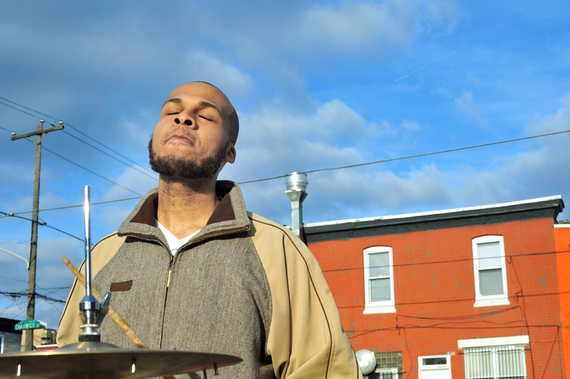My Mind on Drums: How I Enable Creativity that Fosters Innovation and Advance Thought Leadership.
I can't speak for every drummer, but for me the process of drumming enables creativity and helps me foster innovation and advance thought-leadership. Studies show that drumming produces deeper self awareness by inducing synchronous brain activity. This coordination can lead to integrative modes of consciousness, which may include greater insight or creativity. So as the trend of crowd-sourcing entrepreneurs to solve social problems intensifies, one can argue -- and one will -- that playing polyrhythms -- the simultaneous use of two or more conflicting rhythms -- can rebirth polymaths into our rapidly growing knowledge-based economy.
A polymath -- a word Harvard Business Review says "is more likely to show up on the SAT than in everyday life conversation because there aren't a lot of polymaths around anymore" -- is a person whose expertise spans a significant number of different subject areas; such as person is known to draw on complex bodies of knowledge to solve specific problems.
Recently, Samuel Arbesman, a writer for Wired magazine, argued that to foster more polymaths people should "embrace the machine," particularly, by learning to code. In response, Alex Knapp, a staff writer at Forbes, wrote an article suggesting that if people want to develop "those creative, problem solving skills, the solution isn't learning to code -- its learning to paint. Or play an instrument. Or write poetry. Or sculpt."
As a self-taught professional drummer who also self-taught myself basic HTML coding and graphic design in order to support my "rogue" journalism initiatives, I agree with both gentleman, but would have to note that I believe my ability to create and scale an online business with no technological background has a large part to do with the fact that I have engaged in the arts my entire life, not just as a drummer, but as an actor, poet and now, at 27 years-old, a budding baritone operatic singer who dabbles on the piano.
When I sit down behind a drumset, playing polyrhythms is how I usually start off my practice sessions, which usually spans about an hour -- it was three hours before founding Techbook Online. I wasn't certain on the science behind what I was doing, but I knew for sure that something magical was happening to me when I played an ostinato over triplets, alternating between my floor tom and snare, for a sustained period of time.
Check out several examples of polyrhythms in my classic solo video: 'Pieces of a Puzzle"
Pat Brown, International Drum Month chairman and Percussion Marketing Council co-executive director, stated: "Playing the drums makes the brain think in a way that very few activities can. Being able to understand musical notes and dissect how rhythms work and go together is a very complicated thought process."
According to the study by E. Glenn Shallenberg at the University of Toronto, IQ test scores of 6-year-old children significantly improved after receiving drum lessons. After recruiting a group of 144 six year-old and separating them into four groups; those receiving drum lessons, voice lessons, drama lessons and no lessons, Shallenberg claims that the children who took drum lessons showed significant improvement in their IQ test, gaining an average of seven IQ points. It's also noteworthy that the children receiving voice lessons increased in IQ by six points, those doing drama increased five points and those who received no lesson improved four points.
Knapp notes in his article, that in the history of the Nobel Prize, nearly every Laureate has pursued the arts. According to research by psychologists Michele and Robert Root-Bernstein:
Almost all Nobel laureates in the sciences actively engage in arts as adults. They are twenty-five times as likely as the average scientist to sing, dance, or act; seventeen times as likely to be a visual artist; twelve times more likely to write poetry and literature; eight times more likely to do woodworking or some other craft; four times as likely to be a musician; and twice as likely to be a photographer.
And although Knapp believes "the science behind why studying the arts boost creativity is still in its infancy," the impact of drumming on our lives -- both physical and physiological -- is well documented and -- in my opinion -- is ready to be played on the big stage. Drumming does not require advanced physical abilities or specialized talents. It doesn't require participants to read music or understand music theory -- I'm admittedly a beginner in that context. Drumming, even a simple pattern, offers benefits to a huge range of people. Drumming is a universal language and last but not least, drumming is freaking awesome!
Want polymaths back in society? Let's all try playing polyrhythms, because I believe that by recognizing patterns and comprehending the similarities in various styles of rudimental application, we can see the similarities between different spheres of knowledge and give birth to innovations that occur at the boundaries of disciplines. Hey, it's worth a rimshot!
Thanks for reading. Until next time, I'm Flood the Drummer® & I'm drumming for justice!
